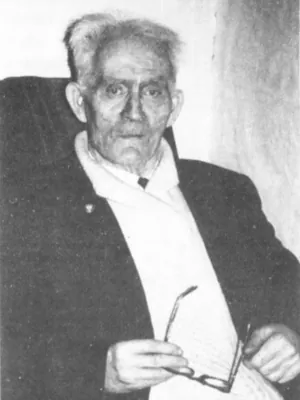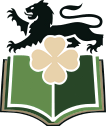John Mulhern
Biography

John (“Johnny”) Mulhern was a native of Aughavanny, near Kiltyclogher in County Leitrim. He was born on 27 March 1900 to John Mulhern and Catherine Healy. One of ten children, Mulhern grew up on the family smallholding in Aughavanny. He attended the local Coracloon (Corracloona) National School, where he was a schoolmate of Seán Mac Diarmada (the future 1916 Easter Rising leader). He left formal schooling at about age 15 (his last day was July 1915) to help work the land. Despite limited schooling, Mulhern was an avid reader and self-educated himself in Irish history, religion, and English literature in later years.
Revolutionary Activity and Imprisonment
Mulhern became involved in the Irish revolutionary movement. During the War of Independence (1919–1921) he “took the Sinn Féin side” and, after the Anglo-Irish Treaty, supported the anti-Treaty (Republican) cause in the Irish Civil War. In 1923 he was interned by the Free State: fourteen months in Sligo jail, and six months at a prison camp in Newbridge, County Kildare. While in Sligo, he joined an eighteen-day hunger strike protesting harsh treatment of Republicans. Mulhern first began composing poetry in Sligo jail, literally writing verse while “lying on a cell floor”. (He later remembered that when he was transferred to the Curragh camp an officer confiscated his poems because they mentioned the rebel Ned Bofin.) He was released in 1924 and returned to Kiltyclogher.
Poetry and Published Works
Johnny Mulhern was a remarkably prolific poet and storyteller. He later estimated that he had written some 60,000 lines of verse over his lifetime. His poetry draws heavily on themes of rural Ireland – love of his home region, the Irish language tradition, nature, faith, and nationalism. For example, one extant piece is a pensive patriotic verse beginning “Oh Ireland true, I long for you…” that speaks of longing for his native Kiltyclogher and the “tranquil shores of Lough MacNean”. Another is a devotional sonnet, “Christmas Longings”, in which the speaker in winter yearns for the bright days of May but remembers that the Nativity is celebrated in December. He also composed explicitly patriotic poems; for instance, an ode in honor of Seán Mac Diarmada invokes the martyr’s memory (“Brave Seán from Corranmore…”).
By some accounts he could even produce sonnets on demand: a friend challenged him to write a sonnet on the spot, and Mulhern did so in under six minutes – he could still recite it from memory years later. Most of his work was unpublished, but he did contribute verses and essays to local outlets such as The Leitrim Guardian and gave recitations on local radio. The Irish Life house magazine even printed selections of his verse after he impressed judges at a community-awards interview.
Overall, Mulhern’s poetry is characterized by its sincerity and simplicity. The local press noted his “outstanding reputation as a storyteller” and said his love of “story and verse” was second only to his love of life. His poems often mix nostalgia for the Irish countryside with devotion (for example, invoking the Virgin Mary in the Christmas sonnet) and pride in Ireland’s revolutionary past. His work kept alive the rural and Gaelic literary tradition of his youth.
Farming, Crafts, and Traditional Medicine
After being released, Mulhern returned to his native hills as a small farmer. He spent decades working the land around Straduffy Cross, Kiltyclogher. In addition to farming, he became known for his manual crafts and folklore knowledge. During internment he had learned basket-weaving and wickerwork from a prisoner from Tipperary, and in later life he taught these skills to others. From 1986 onward he organized weekly craft classes for elderly patients and community members – teaching wicker-basket making and threadwork at the Manorhamilton Day Hospital and in Kiltyclogher.
Mulhern also maintained a secret herbal remedy passed down through the generations of his late sister’s husband’s family, the Maguires. He was famous for a traditional shingles ointment said to cure even severe cases. According to Mulhern, the ointment’s basic recipe included herbs from the local area and unsalted butter. By the 1980s, people from across Ireland and even abroad (USA, Germany, New Zealand) would give Johnny Mulhern a call when doctors failed to relieve their pain.
Later Recognition and Legacy
In his later years, Mulhern received local and national recognition as a charming eccentric and community leader. At age 88, he was nominated by the District Nurse for the Irish Life “Pensioner of the Year” competition; he became one of ten national finalists and ultimately won a £500 contribution to the Day Hospital Crafts Centre of Our Lady’s Hospital, Ballyshannon. The Irish Life committee praised him for combining “the skill of the craftsman with the personal qualities of care and compassion”. The accompanying newspaper profile described him as having “memory and wit…sharper than ever”, and noted that he could recite sonnets and story-tell for hours. He was interviewed on RTÉ radio (e.g. Jim Fahy’s “Looking West” programme) where he recited verses and spoke about Leitrim folklore.
Through the 1980s and ’90s Mulhern became a beloved local character. He held craft classes in Kiltyclogher and was often sought out for conversation. Each year on Seán Mac Diarmada Day (the anniversary commemorating the 1916 leader from nearby Corranmore) crowds of visitors would stop at Mulhern’s cottage. He “took great pride” in seeing throngs gather outside his door for the annual march and commemoration, and many a person went home late after the event because of a call to chat with him. The Kiltyclogher Heritage Centre (Mac Diarmada Homestead) preserves some of his writings, including a poem for Mac Diarmada, as part of its collection.
John “Johnny” Mulhern died in 1996 at the age of 96, leaving a legacy as a custodian of North Leitrim’s history and traditions. He is remembered in local histories and newspapers as a poet-farmer, a craftsman, and a genial preserver of the Irish rural heritage. His life exemplified the generation of rural Irishmen who experienced the revolutionary era, farmed the land, and kept alive folk knowledge into the late 20th century.
Works
Poems
References
- John is the Toast of Manorhamilton. (1988, July 16). Leitrim Observer, p. 7.
- Late Johnny Mulhern, Kiltyclogher: An Appreciation. (1996, December 4). Leitrim Observer, p. 20.
- Mulhern, J. (1979). Kiltyclogher Poet. The Leitrim Guardian. Retrieved June 28, 2025, from https://leitrimdoc.ie/leitrim-guardian-journal-1969-1999/.
- Mulhern, J. (1981). Christmas Longings. The Leitrim Guardian. Retrieved June 28, 2025, from https://leitrimdoc.ie/leitrim-guardian-journal-1969-1999/.
- Quinn, E. (1988, September 24). Kiltyclogher Pensioner has Cure for Shingles. Leitrim Observer, p. 8.
